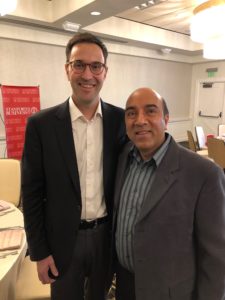 I had the pleasure of meeting Stanford GSB Dean Jon Levin yesterday in La Jolla over lunch. We previously met last March. This time, we had a splendid discussion about some of the trends that he considers vital to the future of business education and at the GSB in particular. These involved two primary themes: technology and the “challenge of opportunity”.
I had the pleasure of meeting Stanford GSB Dean Jon Levin yesterday in La Jolla over lunch. We previously met last March. This time, we had a splendid discussion about some of the trends that he considers vital to the future of business education and at the GSB in particular. These involved two primary themes: technology and the “challenge of opportunity”.
Impact of Technology
The expansion of technology continues to create greater opportunities in business, but also creates some challenges. One of the biggest challenges according to Dean Levin is that of privacy. Business leaders need to think through privacy issues inherent in their product and service offerings in order to protect their customers and employees and to maintain trust with these stakeholders. This has led to changes in the types of skills that future business will need. Dean Levin referred to this as the “ascendency of the MBA skill set.”
What skills will take on greater importance for business leaders? Dean Levin believes that collaboration and teamwork, leadership, and analytical skills will be essential to manage projects that will inevitably be of greater scope and complexity. Furthermore, business leaders will need to be versed in data and information management. Ethics will also play a role, as leaders need to think about how to deploy technology in a responsible manner. The GSB is adapting to these challenges through curriculum changes. Data Science is now a required course for all first-year students. Courses such as Startup Garage have incorporated an ethics component. Electives are being added in Artificial Intelligence, such as the AI and Humanity course taught by Professor Jen Aaker. Finally, a Stanford-wide human-centered AI initiative is expected to launch in March.
Challenge of Opportunity
Dean Levin believes that liberty and opportunity are two great features of capitalist economies. But this leads to the “challenge of opportunity” – are we creating enough opportunity in society? This is an important question in training the next generation of business leaders. As such, the GSB emphasizes “purposeful leadership” as a theme. Future business leaders need to understand their role in creating equal opportunities in society. This entails teaching the importance of values and responsibility. The GSB is incorporating this topic in its curriculum through class discussion as appropriate. The GSB is doing its own part to broaden access to a Stanford MBA by offering more fellowships so that financial constraints don’t prevent worthy candidates from attending the GSB.
Globalization
Finally, we talked about globalization as a further challenge that business leaders need to manage. The current first-year class at the GSB hails from 60 different countries, allowing for greater discussion of global issues during class. As more opportunities for healthy debate arise, Dean Levin believes that it is important for students to engage in a respectful manner: stay calm, listen openly, and clearly articulate their thoughts and vision.
